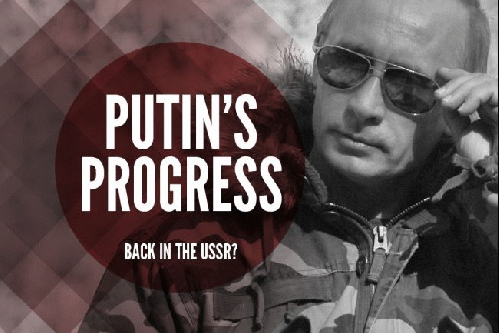First published in The Washington Times (sponsored insert) on June 11, 2013
The ongoing debate over the policy the US should take toward Russia has avoided the central question: is the current Russian political system really on the verge of collapse as it critics suggest, or is it likely to be with us for a good long while?
Those who believe in the regime's longevity say that prioritizing the promotion of values over all other concerns would be self-defeating. Given the global challenges the United States faces, it would be better to mute our public criticism of Russia and foster an agenda of cooperation rather than competition.
Putin's critics, on the other hand, say that since his days are numbered it makes more sense to prepare for his replacement. One way to build bridges to his successor is by emphasizing American values and principles.
This debate is hardly new. Indeed, it runs like a red skein, through the history of our relations with the Russian Empire, the Soviet Union, and now the Russian Federation. What has persisted throughout, however, is a dismal view of Russian politics, which serves to justify hostility toward Russia's rulers. The late UC Berkeley historian Martin Malia liked to say that since Western animosity toward Russia did not arise from Communism, there was no reason for it to disappear with Communism's collapse.
One consequence of this jaundiced narrative is that it makes negativity about Russia the norm. This prevents Western observers from recognizing positive opportunities when they present themselves, and leads them to attribute policy differences with Russia to a "values gap."
President Obama's reset policy is a good example. The reset is over not because it failed to bring tangible benefits, but because it can no longer be defended. It was destined for a short lifespan because even as American diplomats were negotiating agreements with Russia on arms control and logistical assistance in Afghanistan, they saw no possibility of ever forging a lasting strategic partnership with Russia.
The reset therefore followed the fate of its predecessors, from Eisenhower's "spirit of Camp David" to détente. As soon as its immediate objectives are achieved, the policy loses its rationale for bipartisan support and is condemned for "failing to be true to American values."
The result is what I call "the values trap."
Every US administration since that of President Ford has had to deal with the values lobby, which promotes some combination of human rights and democracy as the fundamental objective of US foreign policy. Because the pursuit of these values often runs into conflict with the overall objectives of Washington's foreign policy, presidents try to compartmentalize them in ways that prevent it from causing too much damage. The Obama Administration's low-key implementation of the Magnitsky Bill, followed by the reassuring message carried to Moscow by National Security Advisor Thomas Donilon, are both typical in this regard.
This suggests that, contrary to the assumptions of most pundits, disagreement over values is not what is poisoning our relations with Russia. Much more damaging is the stubborn unwillingness of many to acknowledge Putin's enduring popularity, and to recognize that it is rooted in the genuine appeal of his centrist political agenda. Putin has remained at the helm because he consistently delivers what the Russian electorate demands.
By contrast, Putin's political opponents garner only marginal public support not because of repression, but because they are plagued by personal rivalries, internal dissension, organizational incompetence and sheer political immaturity. The prospect of regime change in Russia is therefore so slim as to be risible. And since the rationale for putting values fi rst in our relationship with Russia hinges on the imminent collapse of the Putin regime, it can only lead to another cycle of disappointment.
The values trap elevates the US foreign policy above its true merits, while castigating America's erstwhile adversaries beyond their true sins. The net result is that periods of realism alternate with bouts of moralism in American diplomacy, sucking the life out of every potential breakthrough in Russian-American relations -- even Russia's abandonment of Communism!
We could bring to an end this vicious circle by acknowledging that there is no real values gap between the West and Russia, at least one no greater than that with Turkey, Israel, Greece or Italy. In fact, as Dmitry Medvedev pointed out during his first visit to the West as President of Russia, "Russian and European democracy share common roots. We share the same set of values and the same sources of law: Roman, Germanic and French law. . . . We have a common history and we share the same humanitarian values."
Emphasizing the abiding unity of our values, rather than a harping on the occasional differences, would create an intellectual and cultural framework in which Russian and American interests could be seen as complementary rather than antagonistic. The burden of proof would shift from those who are striving to build up a friendship with Russia, to those who assume Russian hostility.
(Note: You can view every article as one long page if you sign up as an Advocate Member, or higher).






